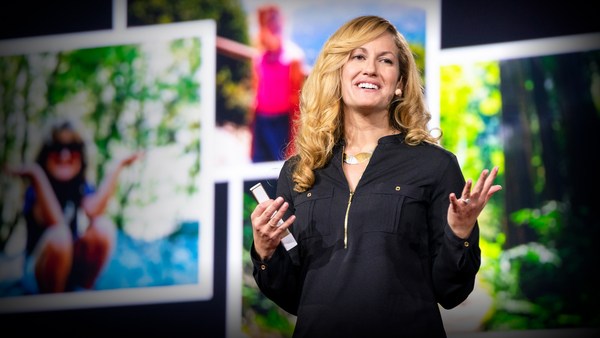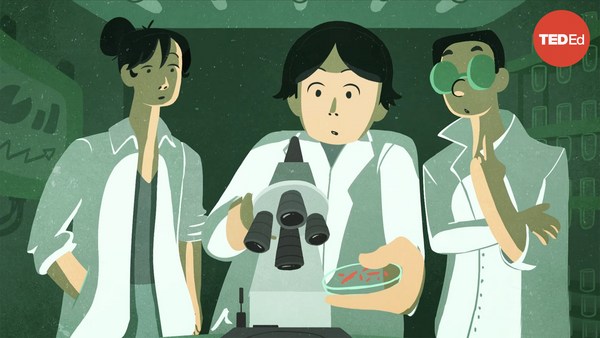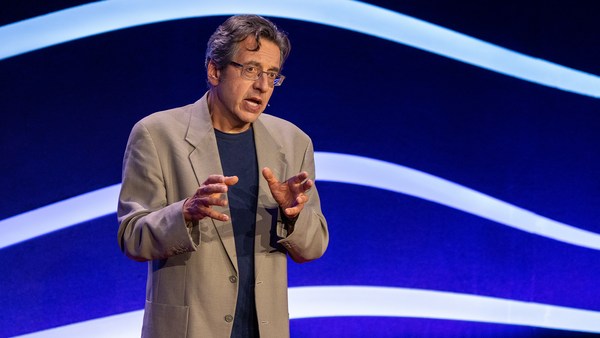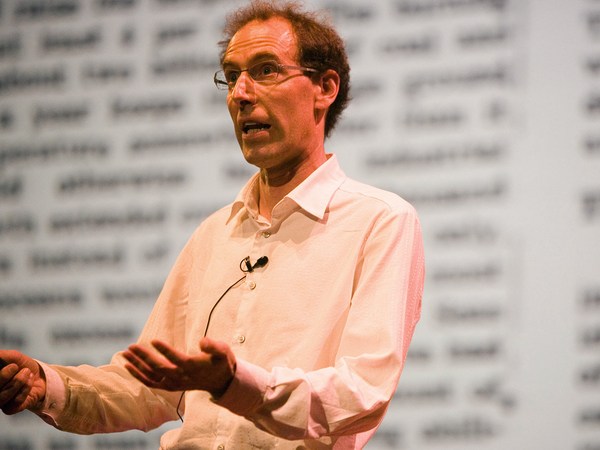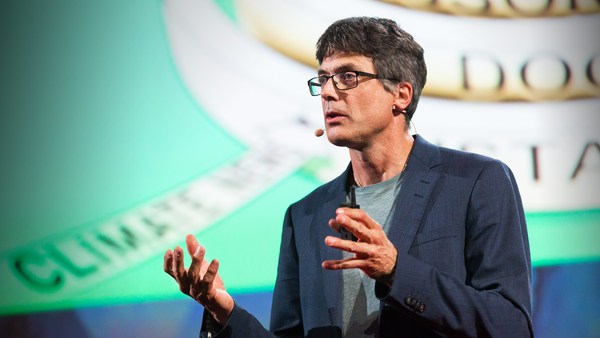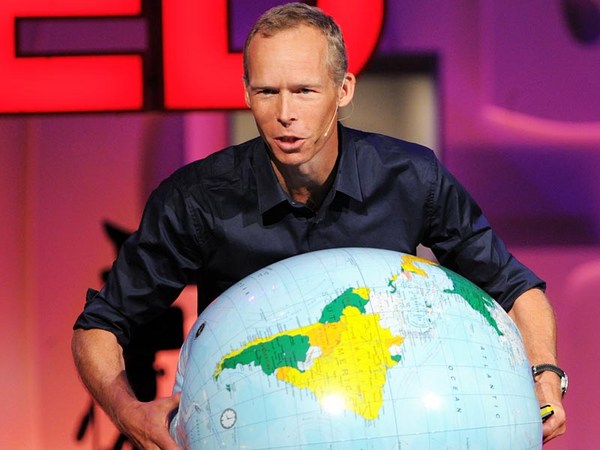Tessa Clarke: So it turns out there’s a super simple solution to the climate crisis. Do you want to know what it is?
Audience: Yes.
TC: Good. I was hoping you would say that.
(Laughter)
All too often, the climate crisis is illustrated with images of polar bears, of wildfires and of floods, while the headlines talk about government negotiations and net zero targets, which makes it all feel so far removed from us. But there's something we're not being told, and it's that 65% of all greenhouse gas emissions are generated as a direct result of household consumption. So that's you. And that's me.
What this means is we have enormous power to solve the climate crisis. And one of the simplest and most effective ways in which we can do this is to do something that humans have been doing for thousands of years, but then in modern life, we've largely forgotten. Put simply, it's to share more and waste less.
Let's take food, for example. Globally, one third of all the food we produce each year gets thrown away, which is worth over a trillion US dollars. And the environmental impact of this is nothing short of devastating.
If it were to be a country, food waste would be the third largest source of greenhouse gas emissions after the USA and China. That's because a landmass larger than China is used every single year to grow food that's never eaten. That includes land that has been deforested, soil that has been degraded, species that have been driven to extinction. It also includes all the packaging and manufacturing, refrigeration and distribution, too. And when a third of that food gets thrown away, most of it ends up in landfill where it creates methane, which is over 25 times more deadly than carbon dioxide.
The environmental impact of food waste is so devastating that Project Drawdown, which is a collaborative piece of work by several hundred of the world's leading climate change scientists, recently identified reducing food waste as the number one most powerful lever that humanity has to solve the climate crisis. Coming above electric cars, above solar power and above a plant-based diet.
To put all of this into a context that's a little bit closer to home, the carbon emissions from just one kilogram of food waste. Let's imagine your food waste caddy, for example, is equivalent to the carbon emissions from landfilling how many plastic bottles do you think? One? 50? 100?
No. 25,000 plastic bottles.
So where does all this food waste take place? Surprisingly enough, it's not at a retail store level. In a country such as the UK, which is typical of much of the Western world, half of all food waste takes place in the home, which means that we, each and every one of us, we are half of this enormous problem.
On the one hand, that's pretty depressing. But if you flip it on its head, it can be incredibly exciting, too, because it means we don't have to wait for governments or businesses. We can be half the solution.
I grew up on a farm where food waste was pretty much a crime and where sharing was second nature, from a glut of marrows to hand-me-down clothes, from a pony to a tractor. But in modern life, we've largely forgotten how to share.
That's because we all live in our little boxes stacked on top of one another, beside one another. We're no longer connected to our local community. And so we no longer have anyone to share with.
That's why, along with my cofounder, we created Olio. Olio is an app that connects people with their local community so they can give away rather than throw away their spare food. How it works is really easy.
Let's imagine you're going away for the weekend or you've overcatered for a party. Or perhaps your toddler's favorite food yesterday is their most hated food today. (Laughs) I think you've been there.
How it works is you just snap a photo of your food and add it to the app. People living nearby get an alert. They can browse the listings, request what they want and pop round to pick it up.
Now you might be thinking, who on earth would want my spare food? But there is no shortage of demand. The average listing is requested in less than 25 minutes. And it's in response to this demand that we now also work with businesses such as supermarkets, restaurants, cafes and canteens.
This is powered by 60,000 trained volunteers who are members of our community, who on their allotted time and day, they pop out of their house and they cross the street. They go to the store and they collect all of the unsold food. They take it home. They add it to the app. Within minutes, people living nearby are requesting it and minutes later they're popping round and picking it up, taking that food from having been considered waste in the store to instead, on average, in just two hours being fully redistributed into multiple homes in the local community.
This now enables businesses to have zero food waste locations. And our aim is that any business anywhere in the world can come onto the platform and organize for their food to be redistributed in their local community in minutes. So that perfectly good food is given away, not thrown away.
We launched in North London in 2015, and since then, over 6 million people from all around the world have joined us. And together they have shared 66 million portions of food. This has had an environmental impact equivalent to taking 200 million car miles off the road and has also saved over 10 billion liters of water because food production is incredibly water-intensive. But what's most exciting is we are doing a tiny fraction of our full potential. Just imagine the impact we can have as we get millions and millions more people sharing.
Now, whilst the environmental impact of food sharing might seem quite obvious, what's less obvious, but no less powerful is the social impact of sharing. Not only does it feel amazing to give away something that you don't want to someone who would like it, sharing also creates connection and strengthens community.
Over 40% of our users tell us that they have made friends through the app and 66% say that it has improved their well-being. And every day we hear countless heartwarming stories, in particular during COVID and the cost of living crisis, which reinforces the power that doing something so simple as sharing your spare can have.
The power of sharing can be applied to so much more than just solving our food waste problem, though. It can also help solve our overconsumption problem more broadly, which is best exemplified by Earth Overshoot Day. Earth Overshoot Day is the day in the year in which humanity has used all the resources that the Earth can replenish in a year. Back in 1971, Earth Overshoot Day was the 25th of December. What this means is that we used in a year what the Earth could replenish in a year. We were living in equilibrium with the planet.
Fast-forward to today. 2022. Earth Overshoot Day was the 28th of July. What this means is that every single thing that every single one of us, almost 8 billion people, are consuming after the 28th of July is net-net depletive to the planet.
Another way of looking at it is that collectively right now we're living as if we have 1.75 planets, which clearly we don't. It appears that we are shopping ourselves to extinction. And this has to stop.
Where most people think about playing their part and living more sustainably, the first thing that tends to come to mind is recycling. But given our relentless rate of resource consumption, we clearly cannot recycle our way out of this mess.
What we need instead is a brand new model of consumption. One where all of our stuff goes from being useless to useful. From “who would want this?” to “I would love that.” From getting to giving, from buying to borrowing, from despair to hope. Sharing instead of shopping needs to become the default.
That's why we've extended beyond just food sharing and our community can now also give away unwanted household items such as toiletries, cleaning products, kitchen appliances, books, clothes and toys. And they can also lend and borrow things instead of buying brand new as well. Because let's face it, we don't all need our own air mattress or cat carrier or disco ball or even, dare I say it, popcorn maker.
(Laughter)
It gives me enormous hope to know that we are part of a broader global movement of real sharing economy companies that are springing up all over the world, connecting communities to share everything from clothing to cars. And we're all united by this simple belief. That the status quo has to change. And with businesses and governments doing so criminally little to solve the climate crisis, we have set ourselves an enormous ambition. We want 1 billion people to be consuming via Olio by 2030.
Because contrary to popular narrative, what we do as individuals does count. After all, it was billions of small actions that caused the climate crisis in the first place. And so surely, by the same logic, billions of small actions can help get us out of it.
Thank you.
(Applause)
